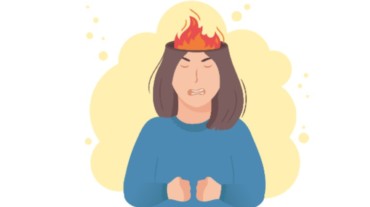Chat with ![]()

Chat with ![]()


Are you irritated with an irresponsible co-worker? You’re probably just PMS-ing. Unable to concentrate on that work presentation? It could be because your ‘period brain’ is hampering your productivity levels. Did you end up forgetting that important file at home? Well, the same ‘period brain’ can be blamed for dimming your cognitive skills and dulling your memory.
Blame it on sexism or just unreliable evidence used in many scientific studies dying to prove the sexism right–women being “less competent” while on their period is one myth that has been around forever.
And while a recent study conducted at the University Hospital in Zurich, dismissed these beliefs and found no correlation between menstruation and a woman’s thinking capacity–many women do report fluctuating performance levels during the different phases of their menstrual cycle.
Now, these fluctuations might have nothing to do with alterations in the brain size as pointed out by several bogus studies conducted earlier. However, the hormonal changes that take place in a woman’s body can cause quite a stir and affect a woman and her overall performance and behaviour.

Let’s take a look at how the menstrual cycle could be doing just that:
Day 1-5 of the cycle
Day one of your period is also the first day of the follicular phase of the ovarian cycle, wherein the uterus sheds off its lining that is no longer required to support foetus growth.
The subsequent days also witness the formation of new eggs that can be released by the ovaries later for fertilization. During this time, oestrogen (female sex hormone) levels in the body begin to increase to support ovulation in the later days.
Also read: Girls, do you always get super-duper hungry before your period? Then, read this

According to a study conducted at the University of California, this upsurge eliminates foggy thinking many women complain about as well as boosts the production of endorphins, a.k.a happy hormones in the body, making most women feel much better.
Day 6-14 of the cycle
During this second half of the follicular phase, oestrogen levels spike up rapidly to support ovulation and the simultaneous formation of the new uterus lining for the next cycle. According to the book The Female Brain, this oestrogen spike can increase a woman’s libido, make her mentally sharper, more flirtatious, and social. This is the time you could feel at your energetic, productive best.
Day 15-28 of the cycle
During the initial days of this phase, you’re likely to be ovulating, i.e. your ovaries would be releasing eggs hoping for them to get fertilised by a sperm and get you preggers! So, the oestrogen would continue to be at its peak in order to support this process and you may continue to feel energetic and productive.

Additionally, according to a study conducted at Indiana University’s Kinsey Institute, you’re likely to get attracted to men with more so-called “masculine” features and even find your sense of self control weakening, especially when it comes to sex—all thanks to the frontal cortex of the brain (responsible for self control) powering down.
However, once the eggs are released into the fallopian tube, oestrogen levels will start decreasing. So, you might start feeling cranky, less productive, and being unable to concentrate as well as you previously could in the later days of this phase.
The simultaneous increase in the cortisol levels during this time of shedding the “now useless” uterine lining can further leave you feeling stressed and fatigued.
That said, please remember: the same rules may not necessarily apply to all women. Because you know it girls, we’re all same, same–but different. Don’t cha?
Get Latest Updates on Intimate Health, Feminine Hygiene, Menstruation, Sexual Health